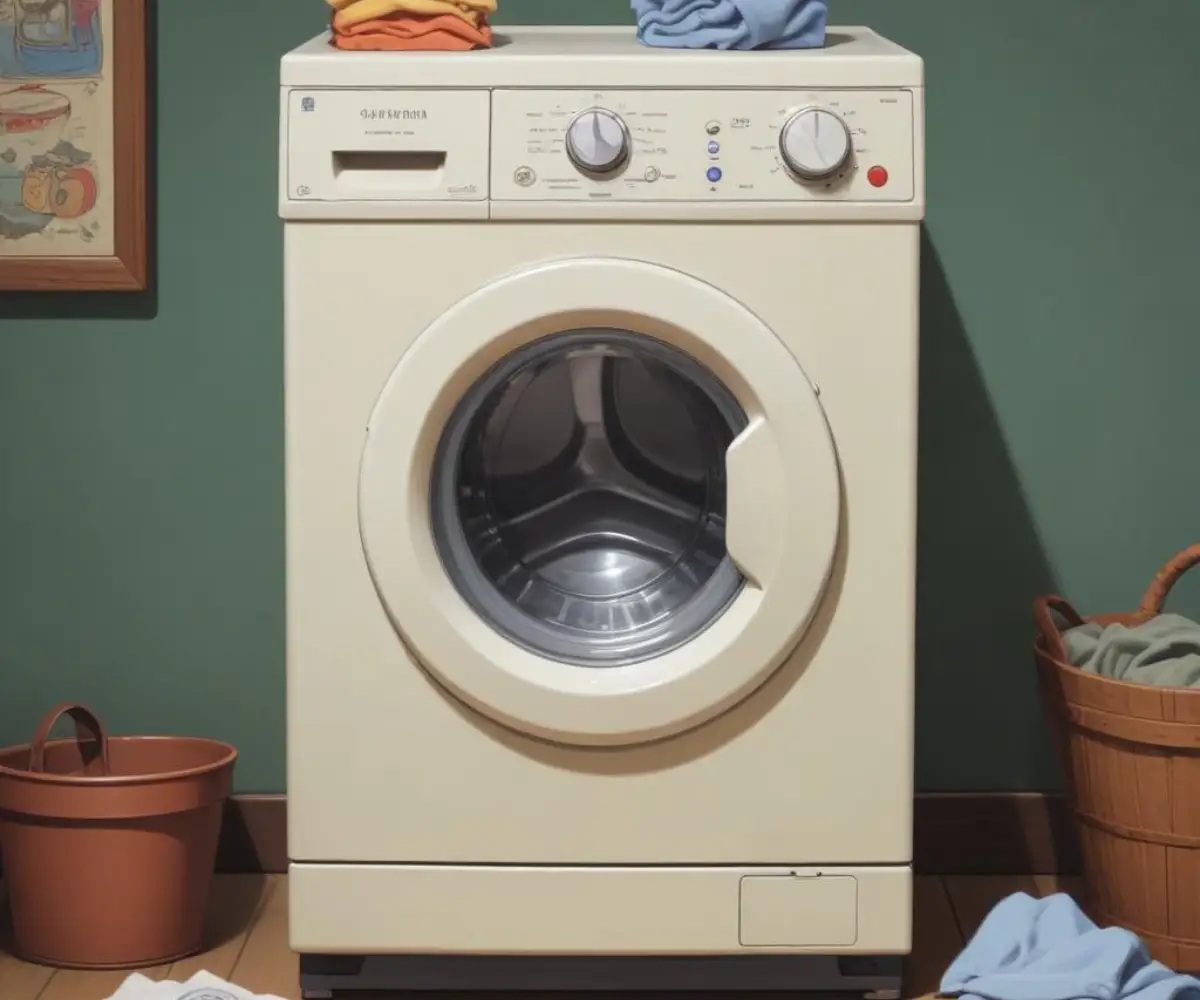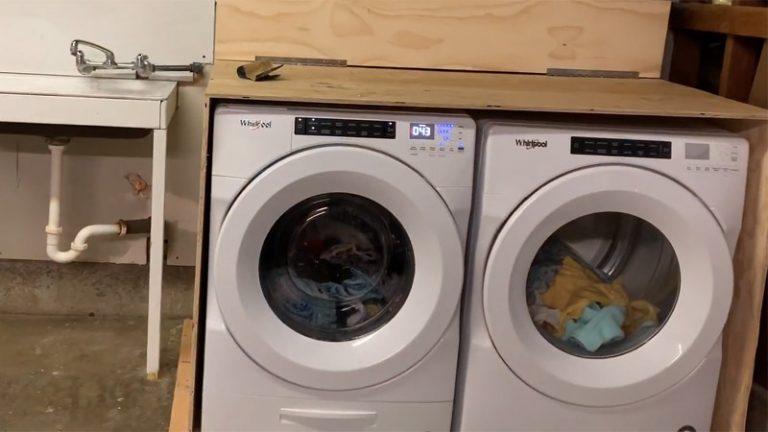Best Non Computerized Washing Machines: Your Guide to Escaping Tech Headaches
You press “Start” on your high-tech washing machine, but nothing happens. The fancy digital display flashes an obscure error code, the array of buttons is unresponsive, and your laundry remains stubbornly dirty. This is the modern laundry nightmare: a smart appliance that’s failed, leaving you with a costly repair bill for a fried computer board.
This scenario has become incredibly common. While “smart” features and endless cycles are marketed as progress, they often introduce a critical point of failure—the motherboard. When that tiny electronic brain dies, your expensive machine becomes a useless hunk of metal and plastic.
You'll Learn About
The Problem: Why Your “Smart” Washer Is a Bad Investment
Modern washing machines are packed with sensors, touch screens, and Wi-Fi connectivity. Appliance repair technicians will tell you these complex electronics are often the first components to break. A simple power surge or a bit of moisture can wreck a delicate circuit board, leading to frustrating and expensive repairs.
The cost to fix a washing machine’s main control board can be staggering, sometimes approaching the price of a new machine. This leaves many homeowners feeling trapped, forced to replace an appliance that should have lasted for decades. The promise of convenience has been replaced by the reality of planned obsolescence, driven by fragile, irreplaceable computer parts.
The Core Issues with Computerized Washers
The frustration with digital washing machines boils down to a few key problems. They are difficult and expensive to diagnose and repair. Their lifespans are often shorter due to the delicate nature of their electronic components.
Furthermore, the overwhelming number of settings can be more confusing than helpful. Many users find themselves using the same one or two cycles for everything, rendering the other two dozen options useless. The core function of a washer—to clean clothes reliably—has been lost in a sea of unnecessary technology.
What Are Non-Computerized Washing Machines?
A non-computerized washing machine, often called a manual or mechanical washer, is a return to simplicity and durability. These machines are built with straightforward analog controls: sturdy dials, knobs, and mechanical timers. Instead of a fragile motherboard, they rely on robust, time-tested mechanisms to get the job done.
These are the workhorses of the laundry world. Think of the machines in a laundromat that run dozens of cycles a day without failing. They prioritize longevity and ease of use over flashy, often unnecessary, digital features. They represent a philosophy that an appliance should be a long-term investment, not a disposable gadget.

Key Features of a Great Mechanical Washer
When searching for a non-computerized washing machine, focus on the fundamentals. Look for a machine with a stainless steel tub, which is more durable and gentler on clothes than plastic. A direct-drive motor is also preferable, as it has fewer moving parts than a belt-drive system and is generally more reliable.
Simple, intuitive controls are the hallmark of these machines. You should be able to select your load size, water temperature, and cycle type with the turn of a knob. This simplicity not only makes laundry day easier but also significantly reduces the chances of an electronic failure.
The Top Contenders: Best Non-Computerized Washing Machines
While the market is flooded with digital models, a few brands have remained true to the principles of durability and simplicity. These manufacturers produce machines that are built to last, easy to repair, and free from the frustrations of modern appliance technology.
Speed Queen: The Undisputed Champion of Durability
When it comes to longevity, Speed Queen is in a league of its own. Known for their commercial-grade construction, these machines are tested to last for 25 years in a typical home setting. Their top-load models, particularly the TC5, feature a classic, robust design with mechanical controls that are simple and incredibly reliable.
Speed Queen washers are built with heavy-duty metal components where other brands use plastic. They offer powerful agitation for a deep clean and are designed to be easily serviced, with front-panel access to internal parts. While they come at a premium price, a Speed Queen is a true long-term investment in a hassle-free laundry experience.
Whirlpool and Maytag: Reliable and Widely Available
Whirlpool and its subsidiary, Maytag, still produce several top-load models that prioritize reliability over complex tech. While many of their models include some electronic controls, they are often more straightforward and robust than those of their competitors. Look for their commercial-grade lines or basic models with dials instead of touchpads.
Repair technicians often praise Whirlpool for its part availability and relative ease of repair. These brands offer a good balance of performance, durability, and value, making them an excellent choice for those who want a dependable machine without the premium price tag of a Speed Queen.
Amana: The Budget-Friendly Workhorse
For those seeking simplicity on a budget, Amana offers basic, no-frills top-load washing machines. These models are known for being straightforward and durable, focusing purely on the essential function of washing clothes. An Amana washer with manual controls is a perfect example of an appliance that does its job effectively without unnecessary complications.
| Brand/Model | Key Feature | Control Type | Typical Lifespan | Pros | Cons |
|---|---|---|---|---|---|
| Speed Queen TC5 | Commercial-Grade Build | Mechanical Dials | 25+ Years | Extremely durable, powerful clean, simple to use | Higher initial cost, smaller capacity |
| Whirlpool Commercial | Deep Water Wash | Mechanical/Analog | 10-15 Years | Reliable, good parts availability, powerful agitation | Can be noisy |
| Amana (Basic Models) | Affordability | Mechanical Dials | 8-12 Years | Very affordable, simple and effective, dual-action agitator | Fewer features, basic design |
The Benefits: Why Simpler is a Smarter Choice
Opting for a non-computerized washing machine offers more than just freedom from digital glitches. These machines provide tangible benefits that make them a superior choice for many households.
Unmatched Durability and Longevity
Mechanical washers are built with heavier-duty components designed to withstand years of constant use. Their simpler mechanisms mean fewer things can go wrong. This robust construction is why brands like Speed Queen are confident in offering industry-leading warranties and are tested for decades of performance.
Ease of Repair and Lower Costs
When a mechanical washer does need a repair, it’s typically a straightforward and affordable process. Parts are often less expensive and easier to source than proprietary circuit boards. For the handy homeowner, many repairs can be a DIY project, and having the best power tool ecosystem at your disposal can make tackling these tasks even easier.
Simplicity and User-Friendliness
There’s a certain peace of mind that comes with simple, direct controls. There are no confusing menus or error codes to decipher. You turn a dial, the machine fills with water, and it washes your clothes—a refreshingly straightforward process that gets the job done without any fuss.
Setting Up Your Laundry Space for Success
Choosing the right machine is only part of the equation. A well-organized laundry room can make the entire process more efficient and pleasant. Consider the layout and ergonomics of your space. The placement of your washer and dryer matters, and sometimes small adjustments, like changing the direction a door swings, can have a big impact. If you’re looking to optimize your home’s layout, understanding how to switch a french door can provide valuable insights into maximizing room flow.
Proper installation is also crucial for performance and longevity. Ensure your washing machine is perfectly level to prevent vibrations and balance issues, which can strain mechanical components over time. Just as a stable foundation is key for any structure, ensuring your appliance is secure is vital; it’s a principle that applies to many home repairs, even a temporary fix for a leaning fence relies on creating stability.
Frequently Asked Questions (FAQ)
Are non-computerized washers less efficient?
While some older models may use more water, many modern mechanical washers are designed with efficiency in mind. Look for models with load-sensing features that adjust the water level automatically. However, the ability to select a deep fill option is a significant advantage for heavily soiled loads, something many high-efficiency digital models have moved away from.
Where can I buy a non-computerized washing machine?
Independent appliance stores are often the best place to find these machines, especially brands like Speed Queen. While big-box stores tend to focus on feature-heavy digital models, they may still carry some basic, mechanically controlled washers from brands like Whirlpool or Amana.
Can I still get a large capacity washer without a computer?
Absolutely. While some of the most durable models, like the Speed Queen TC5, have a slightly smaller tub, brands like Whirlpool and Maytag offer large-capacity top-loaders with simple, robust controls. These are perfect for families or for washing bulky items like comforters.
Final Verdict: Is a Non-Computerized Washer Right for You?
If you value reliability, longevity, and ease of use over smart features and endless cycle options, then a non-computerized washing machine is the superior choice. It represents a move away from disposable technology and a return to appliances that are built to last. By choosing a machine with simple, mechanical controls, you’re not just buying a washer; you’re investing in peace of mind.
It’s about reclaiming control from technology that often fails us. It’s about making a smart, long-term decision that saves you money and frustration. For a truly clean and hassle-free laundry experience, sometimes the best technology is no technology at all.

